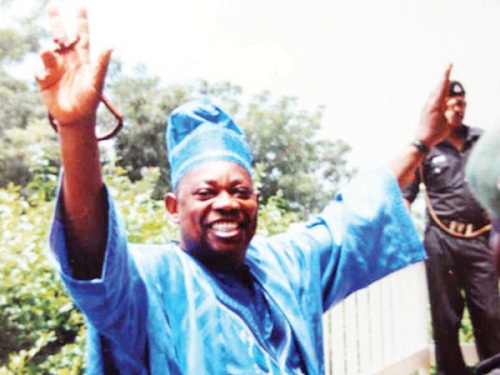Today is the 27th anniversary of the annulled June 12, 1993 presidential elections won by Chief M.K.O Abiola. For a long while, Nigeria was under the jackboot of military rule and the rights of its citizens were reduced to that of subjects and the country subsequently became a pariah entity within the international community. The mindless annulment provided the needed anchor for the ultimate push of the military into the barracks by the pro-democracy movement. For Nigerians born during that period who are now young adults, it is like a fairy tale. Nigerians suffered and fought to get whatever democratic space there is today. The symbolic adoption of June 12 as Nigeria’s ‘‘Democracy Day’’ from the erstwhile May 29 by the present administration, hypocritical as it sounded, is the result of the enduring impact of the struggle for democracy in our country. Beginning from the annulment 27 years ago, pro-democracy elements in the country have commemorated the date, serving as it were a vent for the yearnings for democratic rebirth.
Paradoxically, majority of those in power today, were either those who backed and profited from military authoritarian rule or those who were hiding in the recesses of their bedrooms when pro-democrats ruled the streets in protest against widespread violations of the rights of Nigerians by the military. They have themselves curiously devalued and violated the democratic space thereby shrinking the public space and engendering widespread poverty and underdevelopment despite the country’s enormous resources. So, today provides us an ex-cathedra opportunity to review the state of our democracy under the incumbent state actors. We adopt here an institutional approach to our review.
This has worn thin the weak thread holding the geographical expression called Nigeria. Unprecedented in the history of the country, the presidency has displayed a penchant for loans for the wrong reasons, in quick succession with clear implication of mortgaging the future of the country. Today, the country’s external indebtedness, which stood at $27 billion as at December 2019 is now well above $30 billion. A year ago, the same presidency benefited from the most brazenly rigged electoral process in the country in ways that ridiculed June 12 elections, seen as the fairest and freest in the country’s annals. June 12 symbolised free voting and fair elections and the spirit of June 12 is routinely violated by current state actors.
At the state level, the governours are carrying on like emperors with iron-fist control over the state legislature and the local governments to the detriment of democratic tenets and the values embodied in June 12. In many states, erstwhile governors have taken godfatherism to absurd levels of veto over state business in the presence of incumbents. In states bordering the federal capital territory, the governors hardly spend a week in the states under their watch while frolicking in Abuja. In all, people like the proverbial grass suffer under the lumbering elephants.
We have observed a decline in the activities of civil society that includes the media and wonder what is the matter. Press freedom is ever under assault by authorities with things to hide. But recall that the Press was more courageous during the military days and during June 12th period than now. Remember the guerrilla journalism. The pertinent question is where has courage of the Press gone? And why? In asking this question we are not oblivious of the fact that courageous ones among us have been the butt of repressive governors and ministers. From Cross River to Kaduna and Ebonyi to Abuja, it is a tale of impunity by elected state actors and government appointees. A minister even went to the crude extent of arresting wife and siblings of a journalist in his place. Even General Abacha in his notoriety never went to that level. Freedom of the press is strangely under attack – in a democracy. Even as we celebrate democracy today, the trend still looks gloomy.
The judiciary is the last hope of the common man. But the time worn axiom is being completely negated in Nigeria. These days, the judiciary could be safely branded as the hope of the electoral thieves and treasury looters. In the political sphere the judiciary has usurped the power of the electorate, which alone can confer legitimacy on any government. It has become the ultimate decider of mandates of all hues. The judiciary is now ‘‘electing’’ president, governors and legislators with the people consigned to the spectators in the gallery. This ghastly spectacle combines with the absence of internal democracy in political parties to make a mockery of our extant democratic process.
We must express deep concern about the apathy of the populace. The upper classes are concerned only about getting on with their daily programmes and will not voluntarily alter their routine to carve the time to report a burst water mains, a pothole expanding into a crater, or interrupted electricity supply.
In all this, while the people vegetate in acquiescence, the political leadership gets away with doing nothing and without “the people” demanding their rights to essential services. To make democracy safe here, the people must rise up to condemn impunity and misgovernance and above all demand for their rights knowing well that freedom can never be given on a gold platter. As things are, it appears that the forces that conspire to annul June 12 have reduced the quality of democracy to semi authoritarian civil rule rather than democracy based on the rule of law. Therefore, today’s message is that June 12 compels a change of attitude, such that the people become willing to experience some short-term discomfort to have long-term progress. As Martin Luther King noted “There can be no social gain without individual pain.” The present crop of leaders in the country must realise that governance is about the people and their wellbeing. Those who have no intention to serve this sacred goal have no business being in office.



